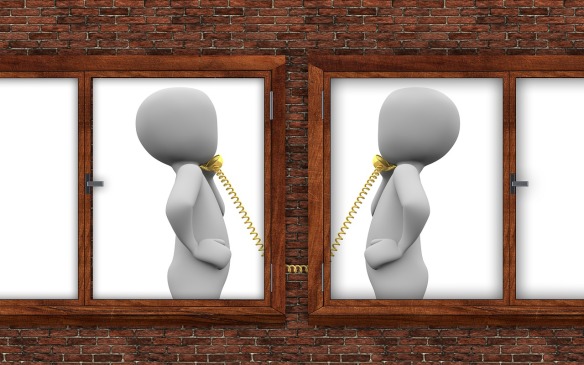By David Joel Miller, MS, Licensed Therapist & Licensed Counselor.
Would better communication improve your relationships?
Communication between people, both verbal communication and nonverbal communication, are the primary ways we build and strengthen a relationship. Communication is a vital part of relationships. Communication has two elements, what you’re communicating and how you’re doing that communication. Good communicators can convey difficult messages in ways that improve the relationship. Poor communication skills can turn even the smallest conflict into a major battle.
When couples come for relationship counseling, they commonly say the problem is communication. Unfortunately, many of them are communicating very effectively, but what they are sharing is all the negative, hostile feelings they have towards their partner. It’s easy to believe that your partner has caused the problems in the relationship. Frequently one or both partners need to look at themselves. For many couples, individual therapy is a prerequisite for effective couples’ therapy.
Improving your communication can facilitate resolving some of these conflicts, but better communication by itself will not make your partner agree with you or change them. First, let’s look at some of the ways that people communicate that increase the number of problems.
Ineffective communication styles can destroy a relationship.
Some communication styles turn every statement into a conflict. Some communication destroys relationships.
Ways to damage communication in a relationship.
Stonewalling destroys communication.
Stonewalling is the process where one or both parties refuse to talk to the other party. Some couples go weeks or even months without ever talking about things. Families may have relatives they haven’t spoken to in years. Stonewalling – refusing to communicate may include walking away while they are talking.
Other harmful styles of communication may result in creating so much pain in your partner that you teach them to withdraw whenever communication gets difficult.
It’s impossible to avoid communicating. Your failure to talk to someone says volumes. This failure to communicate doesn’t solve problems it adds to them.
Criticism – attacking the person rather than asking for change is destructive.
One way people attempt to tackle difficult communication and conflicts is to begin by an all-out attack on the other person. Knock them down and make them give in. Letting your frustration with your partner’s behavior get the better of you and venting all your anger at them isn’t likely to improve the situation. While telling someone what you think of them, venting may feel like a solution at the moment you attack; it now becomes a wound in your partner, which requires them to counterattack or withdraw. Criticism will sabotage your open communication.
Contempt – sarcasm, mocking, put down’s, escalate conflicts.
Belittling someone doesn’t lead to solving the problem. If anything, it pushes the conflict to the breaking point. If you have such a low opinion of someone, why do you have this relationship with them, and why did you start it? Attacking the other person says more about the attacker than the relationship partner.
Defensiveness – taking things as attacks and attacking back undermines communication.
Some people’s responses are all out of proportion to what was said to them. If you take everything your partner says as criticism or attack, you may need to do some work on yourself. People who come from abusive backgrounds, have lived with or grown up around narcissists, develop low self-esteem. Low self-esteem leads to taking any comment as hurtful.
Running away creates distance and destroys intimacy.
For many people in relationships, their go-to way of dealing with uncomfortable topics is to avoid them. When something comes up, they need to talk about; they run away. I’ve seen couples keep this up for decades. Some couples even seem to prefer this way of dealing with problems.
The issues you don’t talk about will continue to get worse, and eventually, they blow up in your face. After years of not dealing with the problems, couples can look at each other and wonder if they have anything in common and any reason to stay together. Lack of communication is not a solution to your communication problems.
Holding on to resentments will poison you and the relationship.
Many people like to hold on to resentments. Their anger keeps them warm at night. While you may not be able to forget something someone did to you, letting go of the resentment benefits you. The need to be right and to make the other person wrong is a corrosive chemical that eats away at your connection.
Not paying attention to your partner sabotages communication.
If the person you’re trying to talk to keeps repeating themselves, it’s likely they don’t believe you are hearing them. One of the best ways to improve communication is to listen to what they’re saying and try to figure out what they mean. Double-check if you’ve gotten their message correctly. Don’t waste your time in a conversation planning what you’re going to say in reply. Most of us humans can’t listen and understand what someone is saying while rehearsing what we are going to say in response at the same time. Failure to understand what they meant leaves you arguing about things they didn’t say and didn’t mean.
Don’t assume you know what they’re talking about.
Jumping to conclusions can sabotage communications. Ask meaningful questions. Make sure you understand their point before you reply.
Don’t over speak, interrupt, or start talking before they finished.
Not only is this rude, but it tells the party talking to you don’t care what they have to say. If you can be patient and listen longer, they may say something useful.
Accept silence as part of a conversation.
Some people are very uncomfortable with silence. Don’t expect your partner to have an instant answer to everything you say. Sometimes a little silence is a good thing. Ask yourself during the silence if your partner has stopped talking to you, or do they need some time to think it over? Things said in anger often damage the relationship, and if you give yourself some time to think of the right way to say something, you can improve communication.
Don’t cross-examine your partner.
Cross-examination should be reserved for the courtroom. You can ask for explanations, but if you are asking questions trying to trip them up and get them to tell you the truth, your relationship is already in serious trouble. Work on making your communication safe and your partner will tell you a lot more. If you don’t trust them, you probably shouldn’t be in this relationship.
Planning communication, when not together improves relationships.
When you’re apart for any length of time, include communication as part of your relationship maintenance. Set a time for phone calls and have rules for when you will text and whether your partner will respond to all your texts.
More tips on improving communication will be found at – Communication.
Staying connected with David Joel Miller
Seven David Joel Miller Books are available now!
My newest book is now available. It was my opportunity to try on a new genre. I’ve been working on this book for several years, but now seem like the right time to publish it.
Story Bureau is a thrilling Dystopian Post-Apocalyptic adventure in the Surviving the Apocalypse series.
Baldwin struggles to survive life in a post-apocalyptic world where the government controls everything.
As society collapses and his family gets plunged into poverty, Baldwin takes a job in the capital city, working for a government agency called the Story Bureau. He discovers the Story Bureau is not a benign news outlet but a sinister government plot to manipulate society.
Bumps on the Road of Life. Whether you struggle with anxiety, depression, low motivation, or addiction, you can recover. Bumps on the Road of Life is the story of how people get off track and how to get your life out of the ditch.
Dark Family Secrets: Doris wants to get her life back, but small-town prejudice could shatter her dreams.
Casino Robbery Arthur Mitchell escapes the trauma of watching his girlfriend die. But the killers know he’s a witness and want him dead.
Planned Accidents The second Arthur Mitchell and Plutus mystery.
Letters from the Dead: The third in the Arthur Mitchell mystery series.
What would you do if you found a letter to a detective describing a crime and you knew the writer and detective were dead, and you could be next?
Sasquatch. Three things about us, you should know. One, we have seen the past. Two, we’re trapped there. Three, I don’t know if we’ll ever get back to our own time.
For these and my upcoming books; please visit my Author Page – David Joel Miller
Want the latest blog posts as they publish? Subscribe to this blog.
For videos, see: Counselorssoapbox YouTube Video Channel



